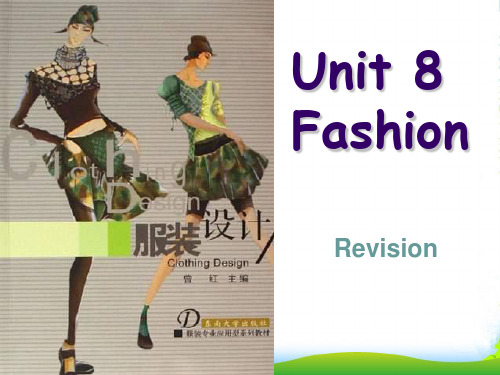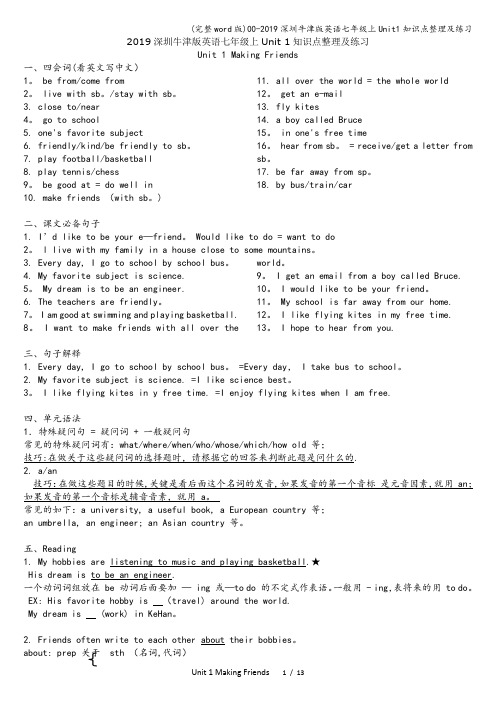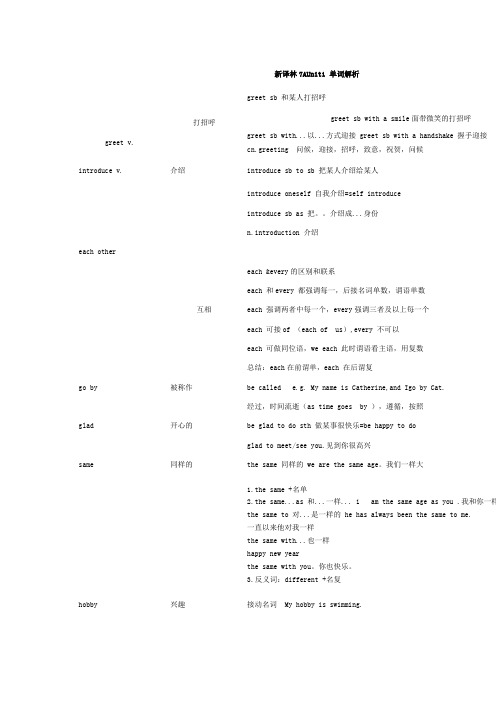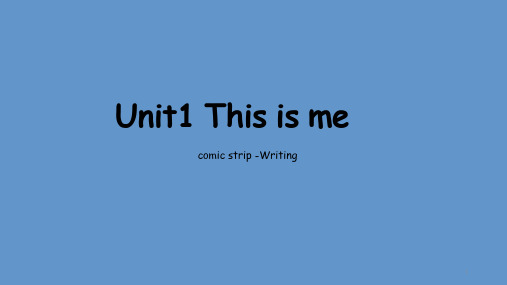牛津译林版英语七年级上册分单元知识点归纳总结(Unit1-8))
牛津译林七年级英语上册Unit 8 Fation 课件(共33张PPT)

15. (1) fit adj. 适合的 这食物不适合孩子吃。
3356..我白认色为和白其衬 他衫任看何起颜来色干都净 很m配y
37.夹克衫既不太长也不太大
fashion I think
design white shirts
look
clean
White matches any other colour
38我的设计包括一条深蓝色牛仔裤
The jacket is not too long or too large.
me yours?
(2) Can I __b_o_r_r_o_w__your bike? =__C_a_n ___y_o_u_ ___l_e_n_d ____m_eyour bike?
10. between: 在两者之间
among: 在三者或三者以上当中 在两餐间
between meals
在凯特和我之间
(周2It)末度你过可:以在床ta上k多e呆s 两个小时m。e
You can________________________________________ at weekends.
spend 2 more hours / another 2 hours in bed
6. I’m thinking about what to wear. 用法:“特殊疑问词+ to +动词原形” 作宾语
33.他们适合长途步行
They feel soft and smooth.
They are fit for a long walk.
fit 形容词,be fit for … 适合…, be fit to do事宜做某事
34.f我it的v时. 装It设f计its me well. fit adj. He exercises to keep fit.
完整版)七年级上册英语Unit1知识点归纳总结

完整版)七年级上册英语Unit1知识点归纳总结Unit 1 Topic 1: e to China!In this topic。
we learn about different ways to XXX: "I am + name," "I'm + name," and "My name is + name." We also learn us ways to XXX。
such as "Good morning," "Good afternoon," "Good evening," and "Good night." "Hi" and "Hello" are more informal greetings。
while "How do you do?" is a formal greeting for first-time meetings。
We also learn how to respond to greetings。
such as "Nice to meet you" or "Nice to see you."nallyXXX's identity。
such as "Are you。
" and "Yes。
I am"or "No。
I'm not." Finally。
we learn about titles used to address people。
such as "Mr." for male teachers and "Mrs." for married women.Unit 1 Topic 2: Where are you from?In this topic。
(完整word版)00-2019深圳牛津版英语七年级上Unit1知识点整理及练习

2019深圳牛津版英语七年级上Unit 1知识点整理及练习Unit 1 Making Friends一、四会词(看英文写中文)1。
be from/come from2。
live with sb。
/stay with sb。
3. close to/near4。
go to school5. one's favorite subject6. friendly/kind/be friendly to sb。
7. play football/basketball8. play tennis/chess9。
be good at = do well in10. make friends (with sb。
) 11. all over the world = the whole world12。
get an e-mail13. fly kites14. a boy called Bruce15。
in one's free time16。
hear from sb。
= receive/get a letter from sb。
17. be far away from sp。
18. by bus/train/car二、课文必备句子1. I’d like to be your e—friend。
Would like to do = want to do 2。
l live with my family in a house close to some mountains。
3. Every day, I go to school by school bus。
4. My favorite subject is science.5。
My dream is to be an engineer.6. The teachers are friendly。
7。
I am good at swimming and playing basketball. 8。
Unit1单词解析牛津译林版七年级英语上册

新译林7AUnit1 单词解析打招呼greet sb 和某人打招呼greet sb with a smile面带微笑的打招呼greet v. greet sb with...以...方式迎接 greet sb with a handshake 握手迎接cn.greeting 问候,迎接,招呼,致意,祝贺,问候introduce v. 介绍introduce sb to sb 把某人介绍给某人introduce oneself 自我介绍=self introduceintroduce sb as 把。
介绍成...身份n.introduction 介绍each other互相each &every的区别和联系each 和every 都强调每一,后接名词单数,谓语单数each 强调两者中每一个,every强调三者及以上每一个each 可接of (each of us),every 不可以each 可做同位语,we each 此时谓语看主语,用复数总结:each在前谓单,each 在后谓复go by 被称作be called e.g. My name is Catherine,and Igo by Cat.经过,时间流逝(as time goes by ),遵循,按照glad 开心的be glad to do sth 做某事很快乐=be happy to doglad to meet/see you.见到你很高兴same 同样的the same 同样的 we are the same age。
我们一样大1.the same +名单2.the same...as 和...一样... i am the same age as you .我和你一样the same to 对...是一样的 he has always been the same to me.一直以来他对我一样the same with...也一样happy new yearthe same with you。
牛津译林英语七年级上册7A-Unit1单元总复习ppt课件

should say
to
each other.
21
Conversation
Sandy: Good afternoon!
Millie: Good afternoon ! I'm Millie. what's your name ?
Sandy: My name is Sandy. Nice to meet you.
24
翻译下列词组:
1. 喜爱电子狗
love e-dogs (an e-dog
)
32. 我你的(的主名人字)叫什么?mWy hmaat’ssteyrour name?
4. 看这本书
read this book
5. 早上好!
Good morning.
6. 下午好! 7. 晚上好!
Good afternoon. Good evening.
I say
to my
parents.
Our PE class is at 4:00
p. m. , so we say
to the PE teacher.
I have supper at my
grandparents' home, so I
say
to them.
Before we go to bed, we
Sandy / æ/
Simon / ai /
14
How do we greet(打招呼) each other?
Good morning. I’m Zhao Mei. My English name isAmy.
Hi, I’m Luo Sang.My English name is Simon.
译林版英语七年级上册第一单元 重点词组与句型

Unit 1 This is me重点短语及句型一、重点短语:1.twelve years old 12岁了One year old 1岁了2. be in Class One, Grade Seven 在七年级一班3. live in Beijing / Donghai住在北京/东海live here/there住在这/那4. love reading / dancing喜欢阅读/ 跳舞love me / my school喜欢我/ 我的学校5. play football l/ basketball踢足球/ 打篮球6. after school/class 放学后/课后7. is good at Maths / swimming擅长数学/游泳8. have long/short hair留有长发/ 短发9. be happy/nice 是高兴/ 好的10. my new friend / classmate我的新朋友/同学11. be / come from Fangshan来自房山12. wear glasses戴眼镜13.some cute e-dogs一些可爱的电子狗14. many hobby许多的业余爱好15. a grade seven student. 一位七年级的学生二、重点句型强化:第三人称单数的概念及相应变化及be动词因不表示具体动作而可以提前R: 1. I am = I’m twelve years old. 我12岁了2. Millie is in Class One, Grade Seven. → Is she in Class 2, Grade 7?Millie是在7年级一班。
她是在7年级2班吗/3. I live in Beijing. → Does he live in Donghai? → He doesn’t live here.我住在北京他住在北京吗?他不住在北京。
2021-2022学年牛津译林版英语七年级上册unit1 age 词汇讲义
Unit1词汇讲义拓展学习法 1 2021-2022学年 牛津译林版七年级英语上册
age英 [eɪdʒ] 美 [edʒ]
第三人称单数:ages第三人称复数:ages现在分词:aging; ageing过去分词:aged过去式:aged age 基本解释
名词年龄; 时代; 老年; 年龄段 及物/不及物动词(使)长大; 使显老; 使变老; 使苍老 不及物动词[化学]老化; 陈化,熟化; (吸毒者随年龄增长而主动)戒毒,戒除毒品 及物动词[化学]使老化; 使陈化; 使熟化; 估计,推测(马的年龄) age 相关词组
1. be of age : 成年; 2. under age : 未到法定年龄; age 相关例句
及物动词 1. Grief ages us. 忧伤逼人老。
不及物动词 1. Since her husband's death, she has aged considerably. 自从她丈夫去世后,她老了许多。
名词 1. My grandfather was bent with age. 我祖父年老背驼。
2. At 40 a man has reached middle age. 到40岁,人已进入中年。
3. What's the age of that old building? 那座古老的建筑有多久的历史了? age 情景对话
Health Insurance-(医疗保险) B:Ohhh, I think I broke my leg. 哦哦哦,我象是把腿给摔断了。 Unit1词汇讲义拓展学习法 2 2021-2022学年 牛津译林版七年级英语上册
A:Here, sir, sit down in this wheelchair. 坐这儿,先生,坐在轮椅上。
B:Thanks. 谢谢。
A:The doctor will be with you in a moment. I just need to ask you a few questions. 医生马上就来。我要问你几个问题。
牛津译林版七年级英语上册7A Unit1 This is me! 知识点详解
译林版英语七AUnit1知识点归纳词汇:1. glad adj. 高兴的,近义词:happy ,pleased 等Eg :Glad to see you . = Nice to see you. = Pleased to see you. 见到你很高兴。
(回答)Glad/Nice/ Pleased to see you, too.2. cute adj. 可爱的,讨人喜欢的。
近义词:lovely,clever,pretty等。
3. glasses n.(复数)眼镜。
A pair of glasses 一副眼镜【知识拓展】:glass : “玻璃”不可数名词。
“玻璃杯”可数名词。
短语归纳1、look after / take care of 照顾2、on the first day 在第一天3、Class 1,Grade 7 7年级1班4、play football 踢足球5、after school 放学后6、be /come from 来自7、be good at / do well in 擅长8、fly kites 放风筝9、tell sb. about sth. 告诉某人关于某事10、listen to music 听音乐11、play a game 玩游戏12、wear glasses 戴眼镜13、at school 在学校14、all the lessons 所有的课程15、talk about 谈论16、need to sth. 需要做...... 17、a lot of hobbies 许多爱好18、get to know 认识19. the same as 和......一样20. use...to do sth. 用......做某事21. live with ... 和......住一起词汇用法区别:1.love, like & enjoy2. read, look, see , watch, look at, have a look at本单元应该掌握的句子:1.What’s your name?你叫什么名字?2.Nice to meet you! 很高兴见到你。
牛津译林版七年级英语上册 Unit1-2单元知识点复习
牛津译林版七年级英语上册 Unit1-2单元知识点复习 Unit 1重点句归纳1. Good morning.2. Good afternoon.3. Good evening.4. What’s your name?5. Nice to meet you.6. Welcome to Class 1, Grade7.7. He is from Nanjing.8. Are you good at English, Sandy?9. She loves dancing.10. Glad\Nice to meet you.11. Listen to the music. It’s nice.12. Sometimes we go home late.13. I come from Nanjing, but now I live with my family in Beijing7A Unit 2重点句归纳1. I enjoy swimming.2. What about you?3. I go swimming every week.4. What’s you r favourite sport, Simon?5. He is a new member of Huanghe Football Club.6. He looks strong and plays football very well.7. In his free time, he studies English.8. It makes him happy.9. I hope his dream comes true.10. How does he look? He looks strong.11. Li Hua also enjoys listening to music.12. Daniel sometimes watches ball games on TV.13. My mum often shops at weekends.14. Many of my students like sports.15. What else do you like to do?16. It makes me feel great.17. I read a lot of interesting books.18. Me too. Reading is fun.19. I am a member of our school basketball team.20. We often talk about basketball and watch basketball matches on TV.21. He is my hero.动词形式基础过关试题用所给动词的适当形式填空:1. Let’s _________(meet) my new classmates.2. He is good at ____________(dance) and I do well in __________(swim).3. Now he ________(live) with his family in Shanghai.4. Those students like ________(play) games.5. Now he _________(have) a nice house in his hometown.6. Now the little girl __________(not like) eating mangoes.7. What about _________(drink) some coffee? You look a little tired.8. Would you like to go ___________(shop) with us this evening?9. Listening to music makes me ___________(feel) happy.10. Those ________(play) coats are over there.11. Liu Xiang sometimes ________(study) English in his free time.12. The boy __________(not do) his homework on Friday evening.13. The old lady often _________(stay) at home to watch TV.14. ----__________(be) your mum good at cooking? ----Of course.15. Do you enjoy ________(walk) in the park?7A Unit 1~Unit 2基础过关测试根据中文写单词:1. ----Are you in _________(年级) Eight?----Of course not. I’m only 12 years old.2. I don’t think it is ________(真实的) unless you show it to me.3. There are twenty _________(成员) in the school football team.4. I often watch football matches at ___________(周末).5. His mother often ___________(购物) in Xinjiekou.用所给单词的适当形式填空:1. Now he _________(have) a nice house in his hometown.2. Now the little girl __________(not like) eating mangoes.3. Let’s _________(meet) my new cla ssmates.4. Liu Xiang sometimes ________(study) English in his free time.5. What about _________(drink) some coffee? You look a little tired.翻译词组:1. He usually _____________(看球赛) with his father on Sunday afternoon.2. Zhao Benshan always _________________(使我们开心).3. The old lady often _________(呆在家里) to watch TV.4. The tall boy doesn’t ____________(来自) Nanjing.5. The beautiful girl doesn’t like _____________(戴眼镜).单项选择:1. ----_________ does she look?----She looks very tall and slim.A. WhatB. WhenC. WhereD. How2. ----Which sound of the underlined letter is different from the others?A. deckB. denC. ebbD. eke3. Lily comes from Beijing, but now she __________ in Nanjing.A. liveB. livesC. is livingD. living4. ----_________ your twin sister good at Maths? ----Of course.A. AreB. IsC. DoD. Does5. ---- Sam, would you like to __________ with me?----Sorry, I have no bat. I have to stay at home to __________. A. play volleyball; watch TV B. play tennis; play table tennis C. play table tennis; read books D. play tennis; play volleyball。
牛津译林英语七年级上册7AUnit1知识点整理
牛津译林英语七年级上册7AUnit1知识点整理Unit1 This is me!1.e-dog: electronic dog电子狗electronic形容词,意为“电子的",组成合成词时省略为“e”。
如: email电子邮件e-friend网友,e -card电子卡。
注意:“一只电子狗”正确译为"an e-dog”,而不是“a e-dog”。
练习题Mr Smith is___C___old man and he usually walks his dog after____supper.A. a;theB.an;aC. an;不填D. the;不填2.master n.主人复数形式为masters.Who's the master of the dog?谁是这只狗的主人?Where is the master of the MP4?这台MP4的主人在哪儿?3.Good morning.早晨/上午好。
(1)Good morning.是人们早上或上午见面时较正式的问候语,用于起床到中午12点这段时间,回答也用“Good morning."(2)Good afternoon是人们下午|面时较正式的问候语,用于12,点月傍晚6点,回答也用“Good afternoon,"(3)Good evening,是人们晚上见面时的问候语,用于晚饭后到就寝这段时间。
回答也用“Good evening."4.What's your name?句中的's是is的缩写,此句型常用来询问对方的姓代名。
为了表示礼貌,还可以在句末加上please, 其前用逗号与前面的句子隔开,即What's your name, please?回答可以用:My name is...或I am..---一What's your name,please?请问,你叫什么名字?--- My name is Mary/I'm Mary..我叫玛丽。
- 1、下载文档前请自行甄别文档内容的完整性,平台不提供额外的编辑、内容补充、找答案等附加服务。
- 2、"仅部分预览"的文档,不可在线预览部分如存在完整性等问题,可反馈申请退款(可完整预览的文档不适用该条件!)。
- 3、如文档侵犯您的权益,请联系客服反馈,我们会尽快为您处理(人工客服工作时间:9:00-18:30)。
1 牛津译林版英语七年级上册 全册知识点归纳总结(最新) Unit one 一、词汇知识点整理: look after \ take care of 照顾 ; 表示look 的短语:look after照顾 look at 看…; look for 寻找 look like 看起来像… on the first day 在第一天 Class One, Grade Seven (先说班级,再说年级,且大写)。 play football 踢足球 after school 放学后 be\come from 来自 be good at \do well in 擅长 fly kites 放风筝 go home 回家 listen to music 听音乐 play a game 玩游戏 wear glasses 戴眼镜 at school 在学校 all the lessons 所有的课程 talk about 谈论 over there 那里 a lot of hobbies 许多爱好 二、结构用法: love\like doing sth 喜欢做某事 let’s +动词原形 让我们 I am\My name is 我叫 welcome to +地点 欢迎来到 This is 这是 be good at \do well in doing 擅长做 in Class…Grade… 在几年级几班 be from = come from + 地点, 意思是“来自某地”。 He is from Nanjing. P8 他来自南京。 live with…in…和谁住在哪里 live with sb 和某人住一起;live in+ 城市名,住在某地; live on the ground floor 住在一楼(用介词on) I’m …year old. 我几岁了。year(s) old ,……岁,如果数词大于1, year 要用复数years. 问年龄要用How old “几岁”提问。例如:- is your sister? --- She is 11. 应填How old. I have (short/long)hair.我留着短(长)头发 三、 句式用法 What’s your name?你叫什么名字? Nice to meet you! 很高兴见到你。 I love reading. 我喜欢阅读 英语.表示“喜欢”的用法:like喜欢 /love喜爱/enjoy喜欢 + V.-ing 形式。 Now let’s meet our new classmates. 现在让我们认识下我们的新同学。 I often play football after school.放学后我经常踢足球。 She is tall and slim. 她个头很高,身材苗条。 He is from Nanjing. 他来自南京。He comes from Nanjing. 2
He is good at Maths. 他擅长于数学。 He does well in Maths. Millie is 11 years old.米莉11岁。 They are all very nice.他们都很好。 I am good at dancing. 我擅长于跳舞。
四、语法归纳: 连系动词be 的一般现在时 动词be 的三变化 am is are. 我(I) 用am ,你(you)用are ,is 用于他(he)她(she)它(it),单数名词用is,复数名词都用are 句型结构: 1、肯定句:主语+am\is\are … It is a football. 2、否定句:主语+am\is\are+not… It is not a football. 3、一般疑问句:Am\Is\Are+主语+其他? Is it a football? 回答 Yes, it is. No, it isn’t 4、特殊疑问句:疑问句+am/is/are +主语+其他? What’s your name? 语法小练习: 用be 动词的适当形式填空 1、She ___________ my cousin. Her name __________ Li Jie. 2、Tom and I ___________ good friends 3、What ________ this in English? It _________ a book 4、___________ you Jack? Yes, I __________ 5、What ___________ those? They _________ his notebooks.
Unit two 一、词汇知识点整理: play sports 做运动 many times a day 一天许多次 play football/tennis 踢足球/打网球 talk about 谈论 after school 放学后 go swimming 去游泳 a member of …中的一员 come from 来自 listen to music 听音乐 in the next World Cup 在下届世界杯 come true 实现 in one’s free time 在某人的空闲时间 live in 住/生活在 read books 看书 at/ on weekends=at/on the weekend在周末 stay at home 待在家里 a lot of 许多 ask sb about sth 问某人某事 on TV 在电视上 Watch basketball matches 看篮球比赛 feel great 感觉特棒 二、结构用法: What about doing sth ?做…怎么样? Enjoy doing sth 喜欢做某事 make sb/sth +adj 使某人/某物 make sb to do sth 使某人做某事 3
want to do sth 想要做某事 hope to do sth 希望做某事 have fun doing sth 做某事开心 三、句式用法 I like walking. 我喜欢散步。 I enjoy swimming.What’s your favourite sport? 我喜欢游泳,他最喜欢的运动是什么? I hope his dream comes true. 我希望他梦想成真。 What does Li Hua do in his free time? 李华在业余时间做什么? What else do you want to do? 你还想做什么其他的事情? Reading is fun. 读书是有趣的事情。 四、语法归纳: 行为动词的一般现在时 行为动词的一般现在时的构成:主语+行为动词+(其他) 当主语为第三人称单数(he, she, it) 时,谓语动词也要用单数形式。 用好一般现在时,时间状态需牢记; 主语人称是三单, 动词要把-s/-es 添; 基本用法要记清,状态习惯经常性。 行为动词的一般现在时的变化 1. 否定句:主语+ don’t/doesn’t + 动词原形+其他 I don’t like bread. He doesn’t often play football. 2. 一般疑问句:Do/Does + 主语+动词原形+其他 Do you often play football? Yes, I am /No, I am not Does he often play football? Yes, he does/ No, he doesn’t 3、特殊疑问句:特殊疑问句+一般疑问句? When do you go to school? I go to school at seven o’clock. 动词的三单形式的变化: 动词三单现在时,一般在词尾加S S,x,ch,sh,在词尾,直接加上-es 词尾若是字母o ,加上-es 不用愁。 词尾是“辅音字母+y” ,先变y为i, 后边再加-es 语法小练习: 用括号内动词的适当形式填空。 1. He often ________(have) dinner at home. 2. Daniel and Tommy _______(be) in Class One. 3. We _______(not watch) TV on Monday. 4. Nick _______(not go) to the zoo on Sunday. 5. ______ they ________(like) the World Cup? 6. What _______they often _______(do) on Saturdays? 7. _______ your parents _______(read) newspapers every day? 8. The girl _______(teach) us English on Sundays. 9. She and I ________(take) a walk together every evening. 10. There ________(be) some water in the bottle. 11. Mike _______(like) cooking. 12. They _______(have) the same hobby.
